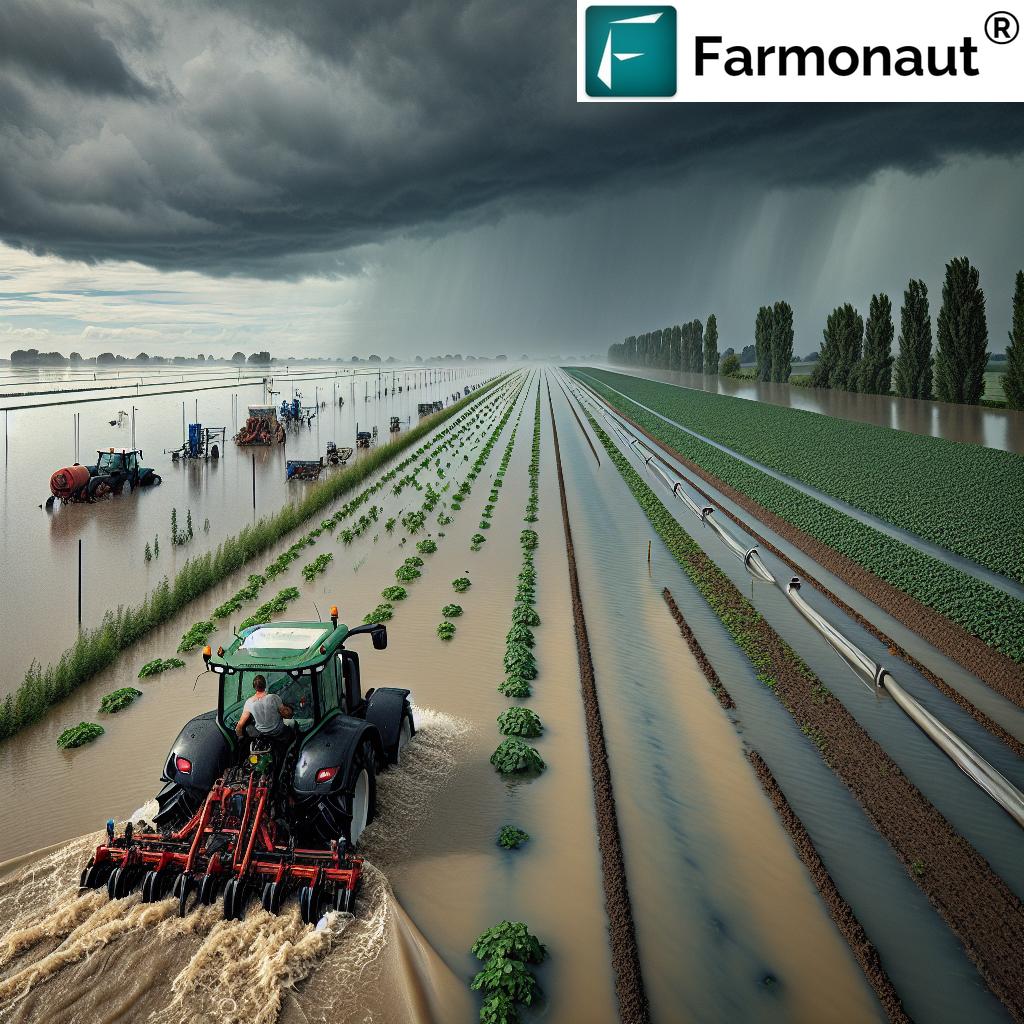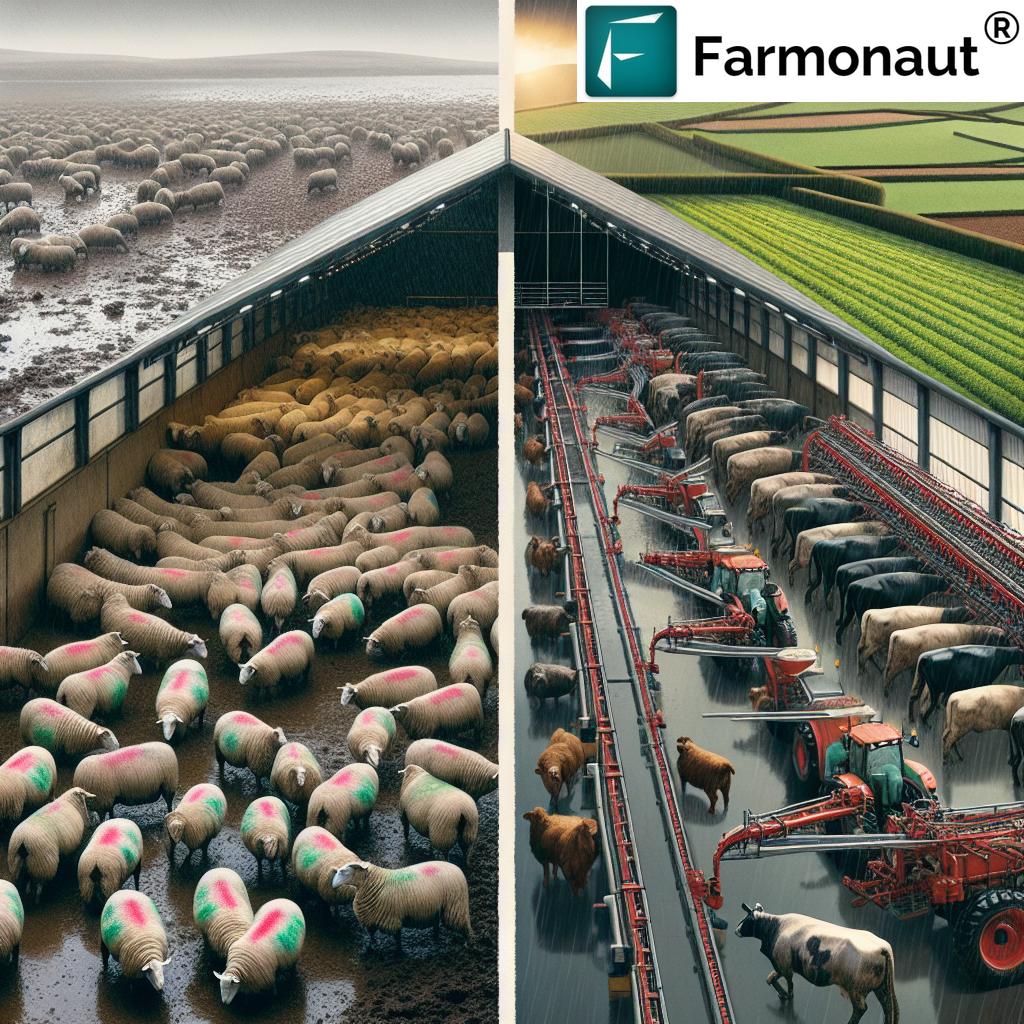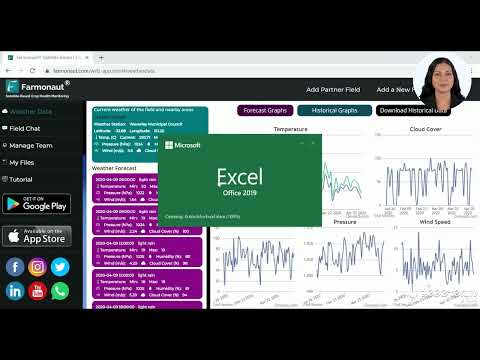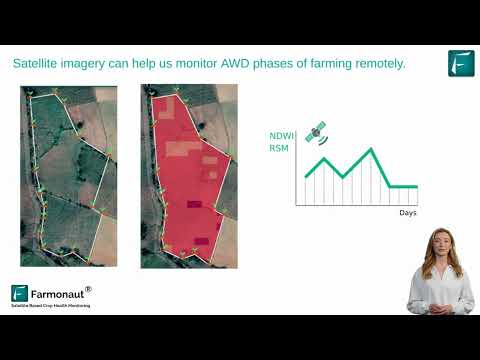UK Farming Resilience: Innovative Solutions to Weather Challenges in Arable and Livestock Sectors
“UK farmers face up to 40% increase in feed and bedding costs due to delayed pasture turnout caused by persistent rainfall.”
In recent years, the United Kingdom’s farming sector has faced unprecedented challenges due to increasingly unpredictable and extreme weather patterns. As we delve into the intricate world of UK agriculture, we’ll explore how persistent rainfall and other weather-related issues are impacting both arable and livestock farming, and the innovative solutions being developed to enhance agricultural resilience.

The Impact of Weather on UK Farming
The weather impact on UK farming has been profound in recent years. Persistent rainfall, in particular, has created a cascade of challenges for farmers across the country. Let’s break down these impacts:
- Waterlogged Fields: Thousands of acres of arable land lie submerged, significantly reducing cropped areas.
- Delayed Planting: Wet conditions have forced farmers to postpone planting, affecting crop yield and quality.
- Increased Costs: The need for additional inputs and alternative management strategies has led to rising operational expenses.
- Livestock Challenges: Delayed pasture turnout has resulted in higher feed and bedding costs for livestock farmers.
These challenges have put immense pressure on the farming community, necessitating the development and implementation of innovative farming solutions to maintain agricultural resilience.
Crop Yield Reduction Strategies
In the face of adverse weather conditions, UK farmers are adopting various crop yield reduction strategies to mitigate losses and maintain productivity. Some of these strategies include:
- Crop Diversification: Planting a variety of crops with different weather tolerances to spread risk.
- Precision Agriculture: Utilizing technology to optimize planting, fertilization, and harvesting based on field-specific data.
- Improved Drainage Systems: Installing or upgrading drainage to manage excess water more effectively.
- Cover Cropping: Using cover crops to improve soil structure and water infiltration during fallow periods.
These strategies are crucial in helping farmers adapt to changing weather patterns and maintain crop yields despite challenging conditions.
Livestock Management in Adverse Weather
Livestock farmers in the UK are facing unique challenges due to the persistent wet weather. Livestock management in adverse weather conditions requires careful planning and innovative approaches:
- Extended Housing Periods: Keeping animals indoors for longer to protect them from wet and muddy conditions.
- Alternative Feeding Strategies: Implementing new feeding regimes to compensate for reduced grazing opportunities.
- Health Monitoring: Increased vigilance for weather-related health issues such as respiratory problems and foot conditions.
- Adaptable Housing Solutions: Developing flexible shelter options that can be quickly deployed in fields during sudden weather changes.
These strategies are essential for maintaining animal welfare and productivity in the face of challenging weather conditions.
For farmers looking to enhance their livestock management strategies, Farmonaut offers advanced satellite-based monitoring solutions. 
Agricultural Resilience Techniques
Building agricultural resilience is crucial for the long-term sustainability of UK farming. Here are some key techniques being employed:
- Soil Health Management: Focusing on improving soil structure and organic matter content to enhance water retention and drainage.
- Climate-Smart Agriculture: Adopting practices that increase productivity while reducing greenhouse gas emissions.
- Water Management Systems: Implementing efficient irrigation and water storage solutions to manage both excess and scarcity.
- Crop Variety Selection: Choosing crop varieties that are more resilient to extreme weather conditions.
These techniques are helping farmers build more resilient agricultural systems that can withstand and recover from weather-related challenges.
Innovative Farming Solutions
Innovation is at the heart of addressing the weather-related challenges faced by UK farmers. Some of the most promising innovative farming solutions include:
- Precision Agriculture Technologies: Using drones, sensors, and satellite imagery for real-time crop monitoring and decision-making.
- AI-Powered Predictive Models: Leveraging artificial intelligence to forecast weather patterns and optimize farm management.
- Vertical Farming: Exploring indoor farming techniques to reduce weather dependency for certain crops.
- Smart Irrigation Systems: Implementing IoT-based irrigation solutions that adjust water usage based on real-time soil and weather data.
These innovative solutions are helping farmers adapt to changing weather patterns and improve overall farm efficiency.
Farmonaut’s satellite-based crop monitoring system offers cutting-edge solutions for precision agriculture. Learn more about our API capabilities: Farmonaut API
Hay and Straw Cost Management
The persistent wet weather has led to skyrocketing hay and straw costs, putting additional pressure on livestock farmers. To manage these costs effectively, farmers are exploring various strategies:
- Alternative Bedding Materials: Using materials like woodchip or recycled paper products to reduce reliance on straw.
- Improved Storage Facilities: Investing in better storage solutions to minimize waste and maintain quality.
- Cooperative Buying: Forming buying groups to negotiate better prices for bulk purchases.
- On-Farm Forage Production: Increasing on-farm production of forage crops to reduce reliance on external sources.
These strategies are helping farmers mitigate the impact of rising hay and straw costs on their operations.
“Thousands of acres of UK arable land lie waterlogged, significantly reducing cropped areas and impacting agricultural productivity.”
Sustainable Agriculture Practices
In the face of climate change and weather-related challenges, sustainable agriculture practices are becoming increasingly important for UK farmers. These practices not only help in managing current challenges but also contribute to long-term environmental sustainability:
- Regenerative Agriculture: Implementing practices that improve soil health, increase biodiversity, and enhance ecosystem services.
- Agroforestry: Integrating trees and shrubs into crop and animal farming systems to improve resilience and diversify income streams.
- Organic Farming: Adopting organic practices to reduce reliance on synthetic inputs and improve soil health.
- Conservation Tillage: Minimizing soil disturbance to improve soil structure and reduce erosion.
These sustainable practices are helping farmers build more resilient and environmentally friendly agricultural systems.
Arable Farming Challenges
Arable farmers in the UK are facing a unique set of challenges due to persistent rainfall and changing weather patterns:
- Soil Compaction: Wet conditions lead to increased soil compaction, affecting root growth and nutrient uptake.
- Reduced Field Access: Waterlogged fields limit access for machinery, delaying crucial farming operations.
- Increased Disease Pressure: Wet conditions create favorable environments for crop diseases and pests.
- Nutrient Leaching: Excess rainfall can lead to the loss of vital nutrients from the soil.
Addressing these challenges requires a combination of traditional knowledge and innovative approaches to maintain productivity in arable farming.
Farmonaut’s mobile apps provide on-the-go access to crucial farm data. Download now:


Farm Diversification Methods
To build resilience against weather-related challenges, many UK farmers are exploring farm diversification methods. These strategies help spread risk and create additional income streams:
- Agritourism: Opening farms for tourism activities, such as farm stays, educational tours, or seasonal events.
- Value-Added Products: Processing farm produce into higher-value products like artisanal cheeses or preserves.
- Renewable Energy Production: Installing wind turbines or solar panels to generate additional income and reduce energy costs.
- Non-Agricultural Land Use: Utilizing parts of the farm for non-agricultural businesses, such as storage facilities or rural workshops.
These diversification methods are helping farmers build more resilient and sustainable business models in the face of unpredictable weather patterns.

Agricultural Technology for Weather Adaptation
Agricultural technology plays a crucial role in helping UK farmers adapt to changing weather patterns. Some key technologies include:
- Weather Forecasting Systems: Advanced forecasting tools that provide hyper-local, short-term weather predictions for farm-specific decision-making.
- Soil Moisture Sensors: In-field sensors that provide real-time data on soil moisture levels, helping optimize irrigation and drainage.
- Crop Modeling Software: Programs that simulate crop growth under various weather scenarios, aiding in crop selection and management decisions.
- Remote Sensing Technologies: Satellite and drone-based imaging systems that monitor crop health and field conditions across large areas.
These technologies are empowering farmers to make data-driven decisions in response to changing weather conditions.
Explore Farmonaut’s developer documentation to integrate our powerful agricultural technology into your systems: API Developer Docs
UK Farming Challenges and Solutions Matrix
| Weather Challenge | Impact on Farming | Traditional Solutions | Innovative Approaches | |
|---|---|---|---|---|
| Arable Farming | Persistent Rainfall | Waterlogged Fields | Delayed Planting | Precision Drainage Systems |
| Livestock Management | Extended Wet Periods | Delayed Pasture Turnout | Extended Indoor Housing | Smart Barn Systems with Climate Control |
| Pasture Management | Excess Soil Moisture | Reduced Grazing Time | Rotational Grazing | Hydroponic Fodder Systems |
| Farm Economics | Unpredictable Weather Patterns | Increased Operational Costs | Diversification of Crops | Weather-Index Insurance Products |
The Role of Industry Support
The challenges faced by UK farmers due to adverse weather conditions require a coordinated response from the entire agricultural industry. Various forms of support are crucial:
- Government Policies: Implementing supportive policies and financial assistance programs for weather-affected farmers.
- Research and Development: Investing in research to develop weather-resilient crop varieties and farming techniques.
- Knowledge Transfer: Facilitating the sharing of best practices and innovative solutions among farmers.
- Financial Services: Developing specialized financial products, such as weather-indexed insurance, to help farmers manage risk.
This industry-wide support is essential for building a more resilient and sustainable agricultural sector in the UK.
Future Outlook for UK Farming
As we look to the future of UK farming in the face of ongoing weather challenges, several key trends emerge:
- Increased Adoption of Technology: Greater integration of AI, IoT, and satellite technology in farm management.
- Focus on Sustainability: A continued shift towards environmentally sustainable farming practices.
- Diversification of Farm Businesses: More farmers exploring non-traditional revenue streams to spread risk.
- Emphasis on Resilience: Building farming systems that can withstand and recover from extreme weather events.
These trends indicate a future where UK farming becomes more resilient, technologically advanced, and environmentally conscious.
Conclusion
The challenges posed by persistent rainfall and changing weather patterns to UK farming are significant, but not insurmountable. Through a combination of innovative farming solutions, sustainable practices, and the adoption of agricultural technology, farmers are finding ways to adapt and thrive. The resilience of the UK farming community, coupled with industry-wide support and technological advancements, provides hope for a sustainable and productive agricultural future.
As we move forward, the continued collaboration between farmers, researchers, technology providers, and policymakers will be crucial in building a weather-resilient agricultural sector in the UK. By embracing innovation, sustainability, and adaptability, UK farming can overcome current challenges and emerge stronger, more efficient, and better prepared for future weather-related uncertainties.
FAQs
- How are UK farmers adapting to increased rainfall?
UK farmers are adapting by implementing improved drainage systems, adopting precision agriculture techniques, and exploring crop varieties that are more tolerant to wet conditions. - What role does technology play in helping farmers manage weather challenges?
Technology plays a crucial role through advanced weather forecasting, satellite-based crop monitoring, and AI-driven decision support systems that help farmers make informed decisions based on real-time data. - How is livestock farming affected by persistent wet weather?
Livestock farming is affected through delayed pasture turnout, increased feed and bedding costs, and potential health issues related to prolonged indoor housing. - What are some sustainable farming practices that help in weather resilience?
Sustainable practices include conservation tillage, cover cropping, agroforestry, and regenerative agriculture techniques that improve soil health and water management. - How can farm diversification help in managing weather-related risks?
Diversification helps spread risk by creating additional income streams through activities like agritourism, value-added product creation, or renewable energy production on the farm.



